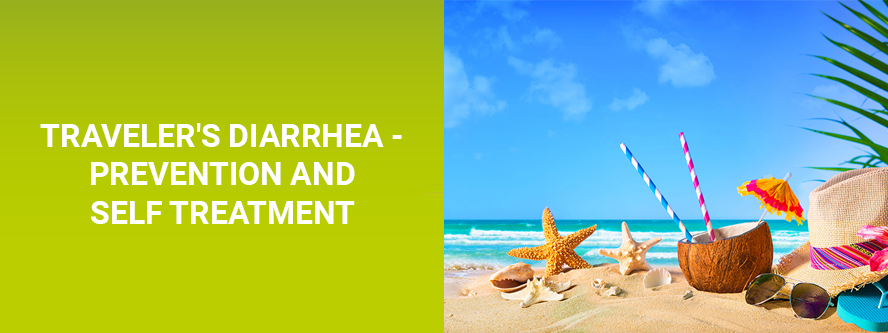Sun, sand, and sea – it would be so wonderful if it weren’t for diarrhea. Diarrhea is the most common illness when traveling. Bacterial infections are most likely the trigger. For healthy adults, these infections are usually harmless and disappear after a short time, even without treatment. Severe diarrhea, which is accompanied by severe water loss, is rare and particularly dangerous for babies, toddlers, pregnant women, diabetics and elderly people.
If you have only soft stools, you don’t have to worry. However, if you have to go to the toilet more often than three times a day, or when the stool is very watery and the overall amount has increased then these are symptoms of mild to moderate diarrhea. If there is no improvement after two to three days or the diarrhea is very severe, you should consult a doctor.
Our travel tips – how you can treat mild diarrhea yourself while traveling:
- Drink plenty of fluids (at least 3 – 4 liters per day) with salts (electrolytes).
- Adults with diarrhea can prepare an electrolyte solution for themselves:
Dissolve ½ teaspoon salt and 5 teaspoons sugar in 0.5 l boiled water, flavor with orange juice.
(Please note this is not suitable for children under 5 years old!) - For children under 5 years of age you can obtain special electrolyte solutions in the pharmacy.
- Salt can also be consumed in the form of clear, salted soup or broth.
- Bananas and apricots are rich in potassium, which is one of the most important electrolytes.
- After the first few days of an acute diarrhea illness, you should try to consume products that contain little or no milk.
- Eat normally as soon as you start to feel better with an increased appetite.
- Medication for acute diarrhea is only useful in some cases, e. g. to slow down dangerous water loss or to survive a long bus journey.
- Colas and pretzel sticks are not a suitable treatment for rehydration and salt intake.
- Gentle colon cleansing with psyllium seeds act like a mild swelling and intestinal lubricant. They cleanse the intestines of putrefactive substances and intestinal gases and promote the growth of intestinal-friendly bacteria. Psyllium seeds are known as well tolerated.
- In case of severe diarrhea, you should definitely consult a doctor.
Note: If you suffer from frequent diarrhea, this could be caused by food intolerances and allergies, e.g. lactose, fructose or histamine intolerance. In this case, we recommend that you get in contact with your health care practitioner (HCP) for further consultation. If these intolerances are not responsible for your diarrhea, the cause may be an IgG food hypersensitivity. IgG food hypersensitivities often remain undetected because the symptoms only occur a few hours or even days after the consumption of a trigger food. This makes them extremely difficult to identify. Fortunately, a reliable diagnostic test and nutritional concept can help: ImuPro. Find out more about the ImuPro test without obligation.


